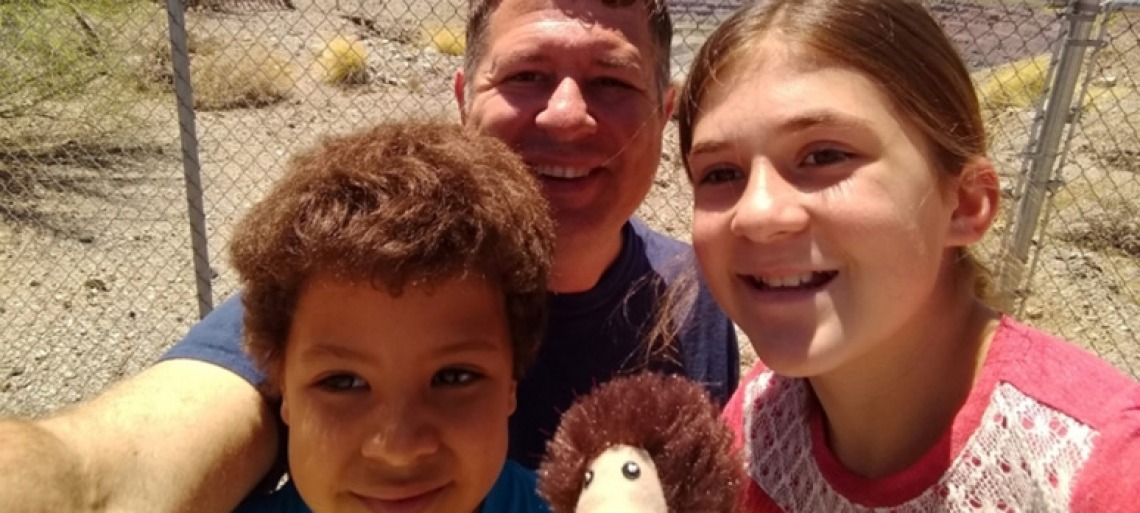Life & Work Connections Has Your Back

Photo: Patrick Walters, IT services coordinator with University Information Technology Services, with son Ellis and daughter Bridgett in December 2019.
In the year since most University employees began working remotely, many have had a few extra balls thrown into their work-life juggling act, such as helping children move to online learning and remotely caring for aging parents amidst a pandemic.
Life & Work Connections moved many of its services online and has continued helping employees facing these and other challenges.
"We're trying to let people know that when they look to get help for their loved ones, it's a sign of courage, resilience, dedication and honor," says Eileen Lawless, dependent care adviser. "We want people to know that they are not alone in this."
While the pandemic or other life circumstances may leave some employees thinking they have few or no options to address the various challenges they face, the Life & Work Connections team is encouraging them to at least reach out to have a conversation about their situation. Often, team members can help expand the slate of potential solutions.
Patrick Walters, IT services coordinator with University Information Technology Services, found himself in need of some support when his kids were making the transition to online learning, and he was wondering what his expectations of them should be. He turned to the parenting workshops and webinars hosted by Lourdes Rodríguez, senior coordinator for child care and family resources, and other members of the Life & Work Connections team. Walters picked up some techniques on how to relate to his kids as they adapted to online learning, and began to feel more justified in his somewhat relaxed approach after breakout discussions with other parents facing the same challenges.
"One of the bigger things that I took away was I'm not the only one who is being a lot more lenient on schoolwork with their kids and giving them the opportunity to work at their own pace," Walters said. "Hearing that other parents are doing the same thing because this is hard for their kids as well is really helpful."
Rodríguez says Walters' situation is not unique.
"Parents often see themselves either as a worker struggling with kids, or as a parent struggling with work," Rodríguez says. "The guilt piece is overwhelming among many parents."
In addition to webinars and workshops, Rodriguez offers one-on-one consultations. She also works with parents to connect them with University resources such as Childcare Choice, which offers employees up to $2,000 in reimbursements per fiscal year per household for qualifying child care, and sick and back-up child care.
Lawless also offers one-on-one consultations. For Melisa Celaya, research assistant professor of internal medicine for the College of Medicine – Phoenix, that involved managing living arrangements for her mother, who has Alzheimer's disease. Before the pandemic, Celaya says, Lawless helped her find an assisted living facility for her mother. Since the pandemic began, Celaya has moved her mother into her house, and says Lawless is helping with that transition as well.
"She's helping me think about things that are going to come up in the future, which is good because I'm a planner," Celaya says. "And things she brought up when my mom first started living with me are happening now, so I'm ahead of the game in that way."
For example, her mother has begun needing more help bathing and dressing herself. She says Lawless had already given her ideas about assistive devices to use at home, so she was ready when the needs arose.
Lawless says her services can also be effective for people helping to care for parents who aren't living with them, as well as caring for adult siblings or other family members with medical concerns, mental health issues or developmental disabilities. In addition to helping employees develop care plans by taking a comprehensive look at family, medical, legal and financial concerns, she connects them with organizations that could be helpful, including the Pima Council on Aging, the Alzheimer's Association and the Sonoran Center for Excellence in Disabilities.
Veronica Chu, senior budget and financial analyst with the Office of Budget and Planning, is part of the sandwich generation: those people who are caring for their kids as well as their aging parents and other relatives.
What first brought Chu to Life & Work Connections was a need to explore child care options for her children.
Rodriguez "helped me identify different resources to understand what quality care guidelines are for the state of Arizona, and understand how to navigate that system," Chu says. "She pointed me to resources and articles about that so I could do my own research and be confident that I was educated about the decision I was making."
More recently, Chu has worked with Lawless as she helps care for her grandmother, who lives in New Mexico. Even though her grandmother is in another state, Lawless was able to help connect her family with several resources.
While the pandemic has necessitated changes in the services provided by Life & Work Connections, Rodriguez and Lawless say their approach remains the same as it was before: working with employees on their priorities regarding child, adult and elder care and helping them put together a plan to find and pursue the best options.
"A silver lining of this pandemic that I am seeing is that sharing your family needs is no longer taboo," Rodriguez says. "Everyone, regardless of their position or role at the University, is facing challenges."
Additional Resources
- Upcoming events and workshops
- April 13: It's Time to Talk: Quality of Life and Caregiving
- April 21: Parenting Styles
- May 13: Adolescents 101
- June 3: Managing Sibling Rivalry
- On-demand workshop videos
- Child care consultations
- Adult and elder care consultations
- Suicide prevention classes
- Pandemic support and resiliency hub
- Wellness articles
A version of this article originally appeared on the UA@Work website.

